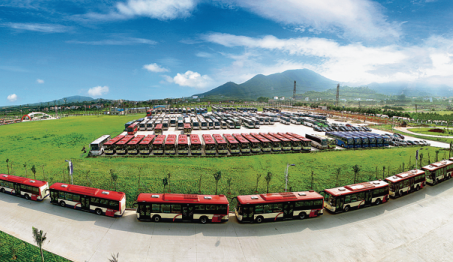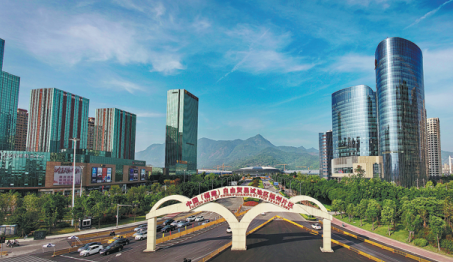Fujian's economy booming with new development
Province in East China saw GDP reach 3.58 trillion yuan in 2018
After 70 years of development, East China's Fujian province has made remarkable achievements in its economic growth, innovation and policy implementation.
In 2018, Fujian's GDP reached 3.58 trillion yuan ($511.64 billion), an increase of more than 2,800 times from 1949, when the People's Republic of China was founded, said Yu Weiguo, Party secretary of the province.
Last year, Fujian's total fiscal revenue surpassed 500 billion yuan, an increase of more than 6,300 times from 70 years ago. Its per capita GDP reached more than 91,000 yuan, ranking sixth in the country, according to Yu.
"We have adhered to practicing the new development philosophy in the province and ramped up efforts to build Fujian into a high-quality and beautiful province in the new era," Yu said. Over the past few years, the province has made efforts in reforming institutions, encouraging innovation, promoting digital construction and calling for green development, he said.
"Fujian has taken innovation as the No 1 impetus to promote its development and has been committed to exploring efficient institutions to support the growth of high-tech companies," Yu said.
Official data show the number of high-tech enterprises increased from 1,528 in 2012 to more than 3,800 in 2018.
"We have constantly promoted digital construction in the province," he said.
In 2018, the province's digital economy hit 1.42 trillion yuan. Behind the boom is the fast development of emerging industries such as new-generation information technology, high-end equipment manufacturing, new material, new energy and biopharmaceuticals.
As a destination for private economies to thrive, Fujian has attached great importance to developing private businesses. Last year, the total foreign trade volume of the province reached $190 billion. It has attracted some 150 Fortune Global 500 companies and more than 58,000 foreign businesses. Innovation has become a consensus among the provincial government, companies and the general public, Yu said.
"Private economies are big players in Fujian," he said.
Most of the private companies are from traditional industries and require urgent technological transformation and innovation, he noted.
The provincial government has invested 8 billion yuan in setting up a foundation for supporting local companies' technological transformation, he said, adding that the provincial government this year has added 10 billion yuan to support private companies' upgrade and transformation.
As a core area of the Maritime Silk Road, the 3,752-kilometer-long coastline and deepwater ports have given Fujian an edge to develop foreign trade.
Fujian Governor Tang Dengjie called on local businesses to expand in international markets.
Official statistics show the export volume of the province increased by 11.9 percent year-on-year in the first half of this year. The volume of trade with countries and regions involved in the Belt and Road Initiative reached 394.6 billion last year, accounting for 31.9 percent of the province's total foreign trade.
Last year, the province officially launched its shipping business featuring the Silk Road. It has opened 34 routes and 593 flights.
In 2015, the province began to offer international railway freight services linking China with Europe and Central Asia. Six of them are regular routes to nine countries and 13 cities in Asia and Europe.
The move signifies the province has realized a combined sea-land transport, Tang said.
Sharing the same ancestral origins and cultural traditions, Fujian is in close proximity to Taiwan across the Straits. The province has carried out a series of preferential policies focusing on Taiwan in fields from communication and transportation to trade cooperation and industrial standards.
In 1981, the first Taiwan-funded company settled in Fujian. Since then, the total trade volume between Fujian and Taiwan has surpassed 1 trillion yuan.
In 2018, the number of newly established Taiwan-funded projects and the paid-in investment from Taiwan in Fujian ranked first and second on the Chinese mainland, respectively.
liangkaiyan@chinadaily.com.cn















